| | | | | | | | | | | Axios World | | By Dave Lawler ·Jul 22, 2021 | | Welcome back to Axios World. - In tonight's edition (1,798 words, 7 minutes) we cover a potential presidential bid from boxer Manny Pacquiao, alleged phone hacking in India and a very unpopular Russian pipeline.
- But let's start with an interview with Belarusian opposition leader Sviatlana Tsikhanouskaya.
New arrival? Subscribe. | | | | | | 1 big thing: Belarus opposition leader pushes Biden to be "braver" | 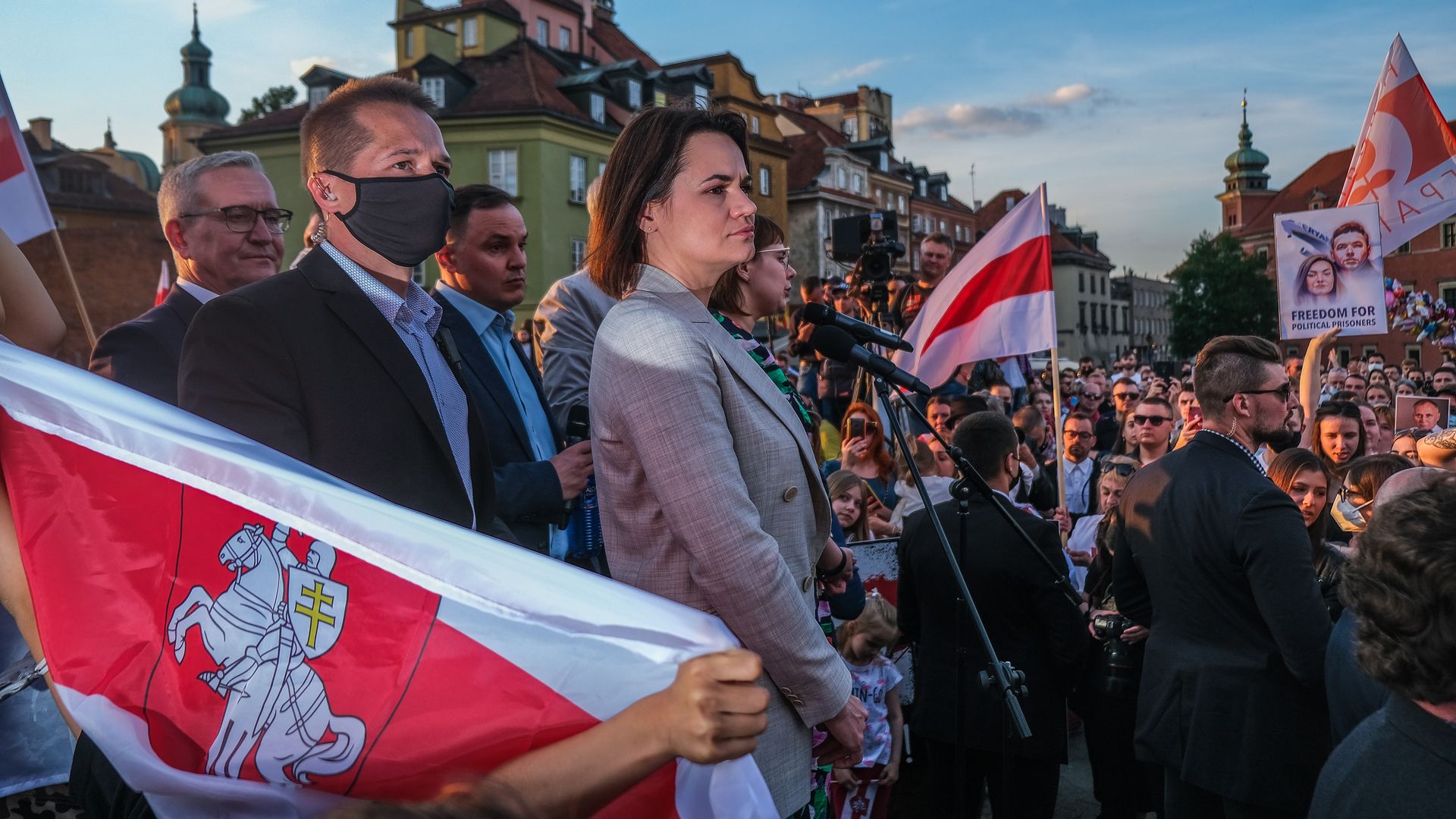 | | | Tsikhanouskaya gives a speech last month in Warsaw. Photo: Omar Marques/Getty Images | | | | Belarusian opposition leader Sviatlana Tsikhanouskaya tells Axios that she asked top U.S. officials this week to be "braver" and "stronger" in challenging Aleksandr Lukashenko's regime. Driving the news: Tsikhanouskaya met with officials including Secretary of State Tony Blinken and national security advisor Jake Sullivan, urging them to apply new sectoral sanctions and attempting to revive some international momentum nearly a year after massive protests first broke out in Belarus. What she's saying: Tsikhanouskaya says that when she proposed sectoral sanctions on government-controlled industries — potash, petroleum, steel, lumber — U.S. officials responded with concern about how such sanctions would affect the people of Belarus. - She argued that the people were already suffering and that stronger action earlier, particularly from the EU, could possibly have struck a decisive blow against Lukashenko.
- Now, she says, the U.S. has a "moral obligation" to stand with Belarusians who are on "the front lines of this world struggle between autocracy and democracy."
State of play: The unprecedented demonstrations that began after a rigged election last year — in which Lukashenko claimed a landslide victory over Tsikhanouskaya — endured for months before fading amid a brutal crackdown from Lukashenko's security forces. Hundreds of Belarusian activists are in jail and many more have fled the country. - Tsikhanouskaya acknowledges that the eyes of the world, and those of Washington and Brussels, have shifted onto novel crises since then.
"My task when I'm doing these official visits is to say, 'Look, I understand the picture disappeared. You were all inspired by our people in those days. But the processes are still going on. People are not going out onto the street not because they gave up, but they were repressed with violence and guns." — Sviatlana Tsikhanouskaya The backstory: Tsikhanouskaya only entered politics shortly before the election, after the arrest of her husband, a blogger and activist who had intended to run. - His trial began last month and is taking place in secret, Tsikhanouskaya says, "because Lukashenko is really afraid of those unbroken people who were the leaders of the movement, who gave inspiration to people."
- "For me, it's rather difficult to be at this place knowing that my husband is a hostage and so are the other people. Of course, he is my beloved person and first of all, I am thinking of him, but all those other people are in my heart as well," she says.
- "Moreover, I am an inexperienced person and there is such a high responsibility on me at the moment," she says, before quickly adding that the ordinary Belarusians risking prison every day are facing just as much.
What's next: Tsikhanouskaya says Lukashenko's government is a stool resting on three legs: money, violence and Russia. Coordinated Western sanctions could cut out the financing leg and cause regime insiders to turn on Lukashenko, she argues — though he is no stranger to surviving under sanctions. - She also says there will be another nationwide workers' strike, but it's not clear when.
- Tsikhanouskaya paints a dark picture of what Belarus will become if Lukashenko hangs on. The country could become "a second North Korea, where nobody has a voice" or be swallowed up by the Kremlin, which has proposed a Belarus-Russia commonwealth.
"We really don't know what's going on beyond the curtain — what Lukashenko is selling to buy loyalty of Kremlin," she says. "Enterprises, banks ... maybe even our independence." |     | | | | | | 2. Philippines: Pacquiao for president? | 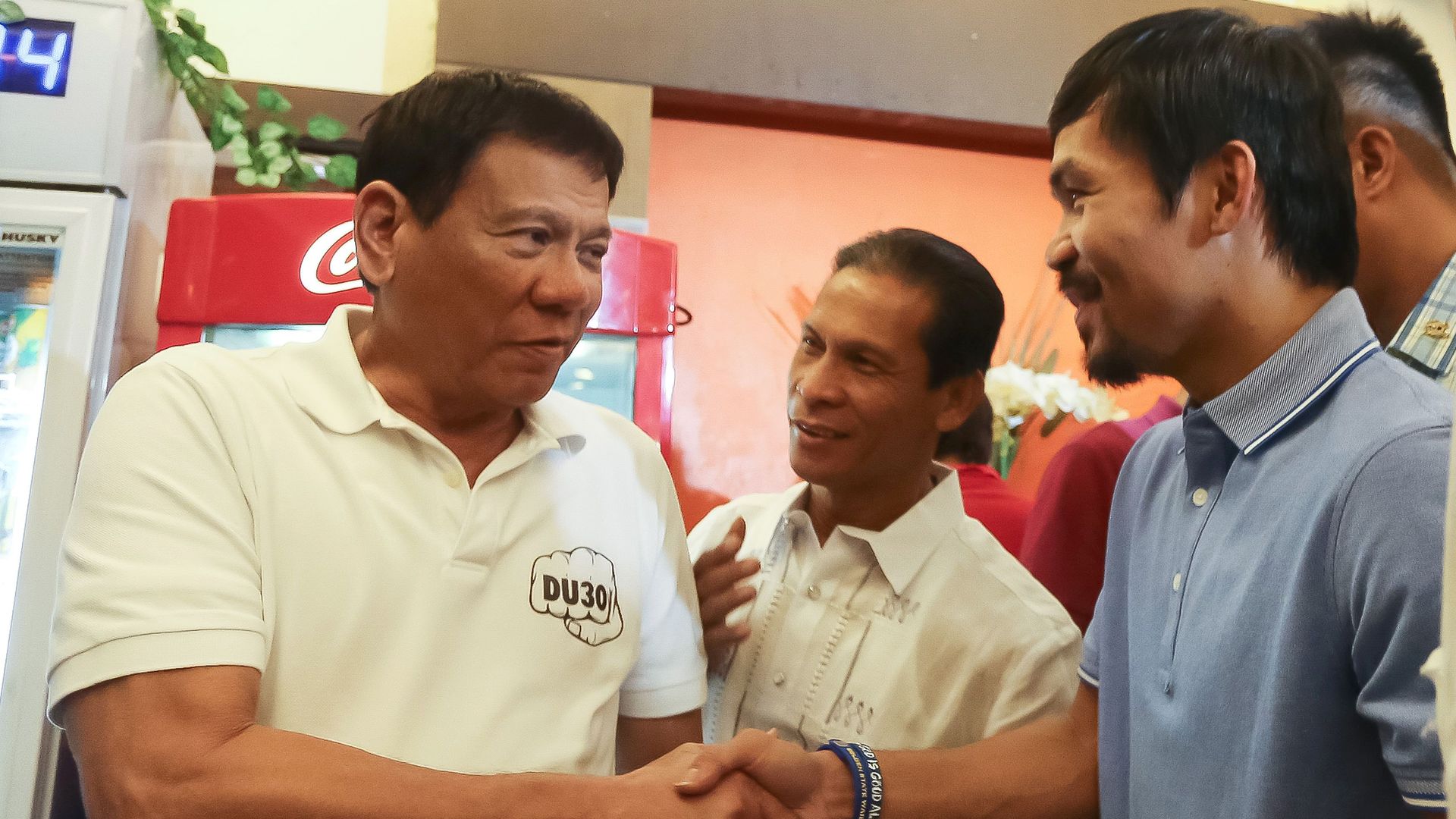 | | | Pacquiao (R) with Duterte (L) in happier times. Photo: Manman Dejeto/AFP via Getty | | | | Manny Pacquiao the boxer is preparing to fight welterweight Errol Spence Jr. next month. But Pacquiao the senator is embroiled in a fight with President Rodrigo Duterte, an erstwhile ally, ahead of next year's presidential election. Driving the news: Pacquiao was ousted as leader of Duterte's ruling party over the weekend after criticizing the strongman for cozying up to China and accusing his government of corruption. - That has increased speculation that the boxing legend, 42, will seek the presidency next May — speculation that Pacquiao has himself stoked.
State of play: Duterte can't run due to term limits, but the early front-runner in the race is his daughter. Some allies of the immensely popular president want him to run for vice president to further bolster her chances, GZERO Media's Carlos Santamaria writes. - Pacquiao, a social conservative who backed Duterte's deadly war on drugs, is currently far behind in the polls. But his universal name recognition and status as a source of national pride could make him a tough challenger.
- A win in the ring against Spence — an undefeated welterweight world champion who is a decade younger than Pacquiao — certainly wouldn't hurt.
|     | | | | | | 3. India: Government accused of hacking, harassing journalists | 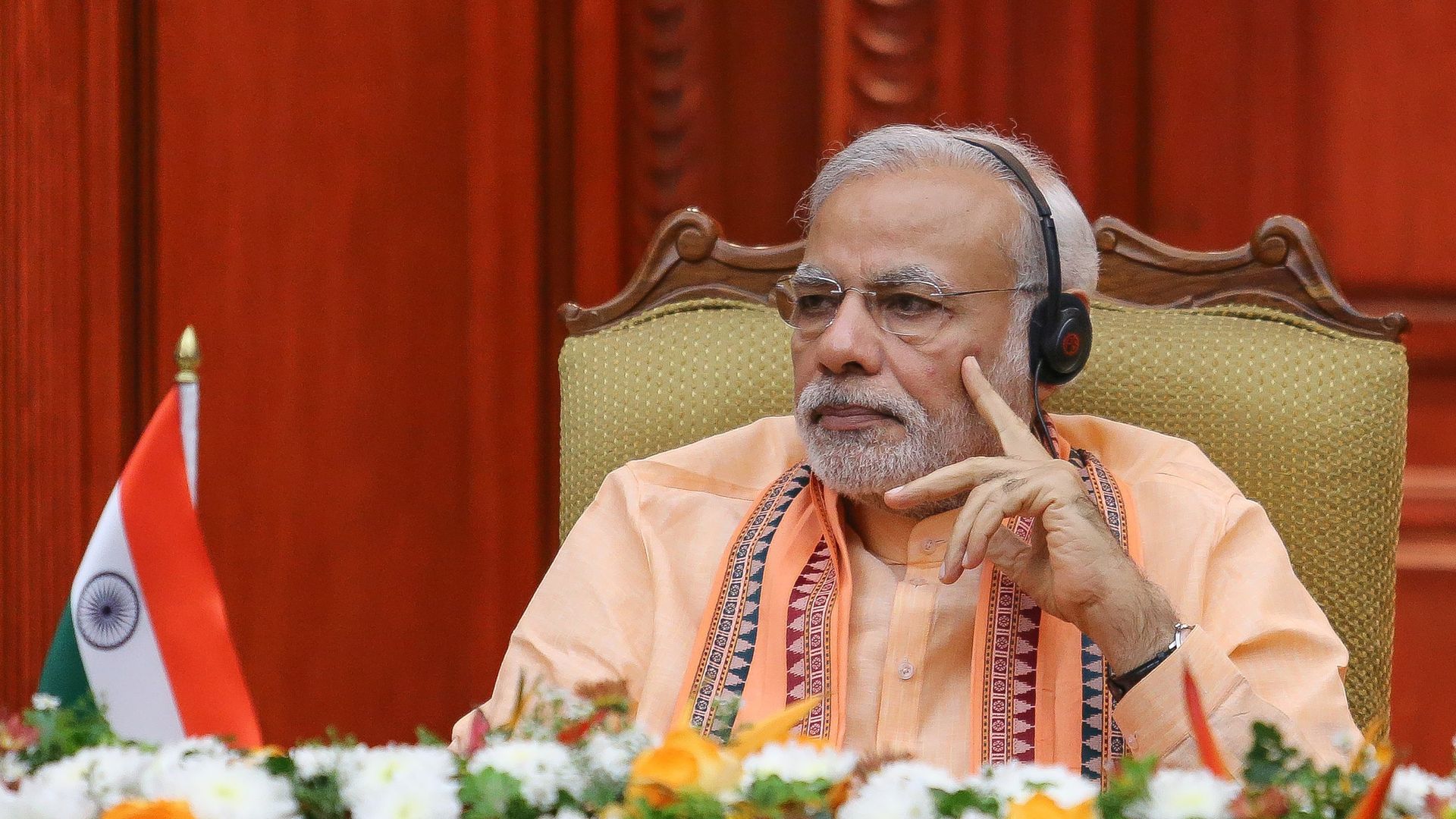 | | | A good listener? Photo: Chamila Karunarathne/Anadolu Agency/Getty | | | | Indian tax authorities today raided the offices of a leading Hindi-language newspaper in what government critics have denounced as yet another attempt to intimidate critical media outlets. - Dainik Bhaskar, the newspaper, has held the government's feet to the fire over its handling of the pandemic. The paper's national editor told the Washington Post that the authorities harassed his journalists and seized their phones.
Driving the news: The raid came days after an international journalism consortium reported that Indian opposition politicians, activists and journalists were among those targeted with spyware from Israeli firm NSO. - The military-grade software was designed to track terrorists and criminals and purchased by countries around the world.
What they're saying: Sushant Singh, one of the journalists targeted for surveillance, writes in Foreign Policy that this is "no less than India's Watergate moment." - Opposition members disrupted parliamentary proceedings on Tuesday to demand an investigation into what the Congress party called "an attack on the democratic foundations of our country."
- Amit Shah, the powerful Home Secretary, called the accusations "conspiracies" intended to "derail India's development trajectory." But the government has declined to say whether it used the Pegasus spyware.
The big picture: Under Prime Minister Narendra Modi, India has fallen to 142nd on Reporters Without Borders' World Press Freedom Index. - Watchdog groups accuse the ruling BJP of unleashing trolls on journalists and pressuring outlets to echo approved narratives. At least 55 journalists were arrested last year for their coverage of the pandemic, The Wire reports.
|     | | | | | | A message from Axios | | Market news worthy of your time | | | 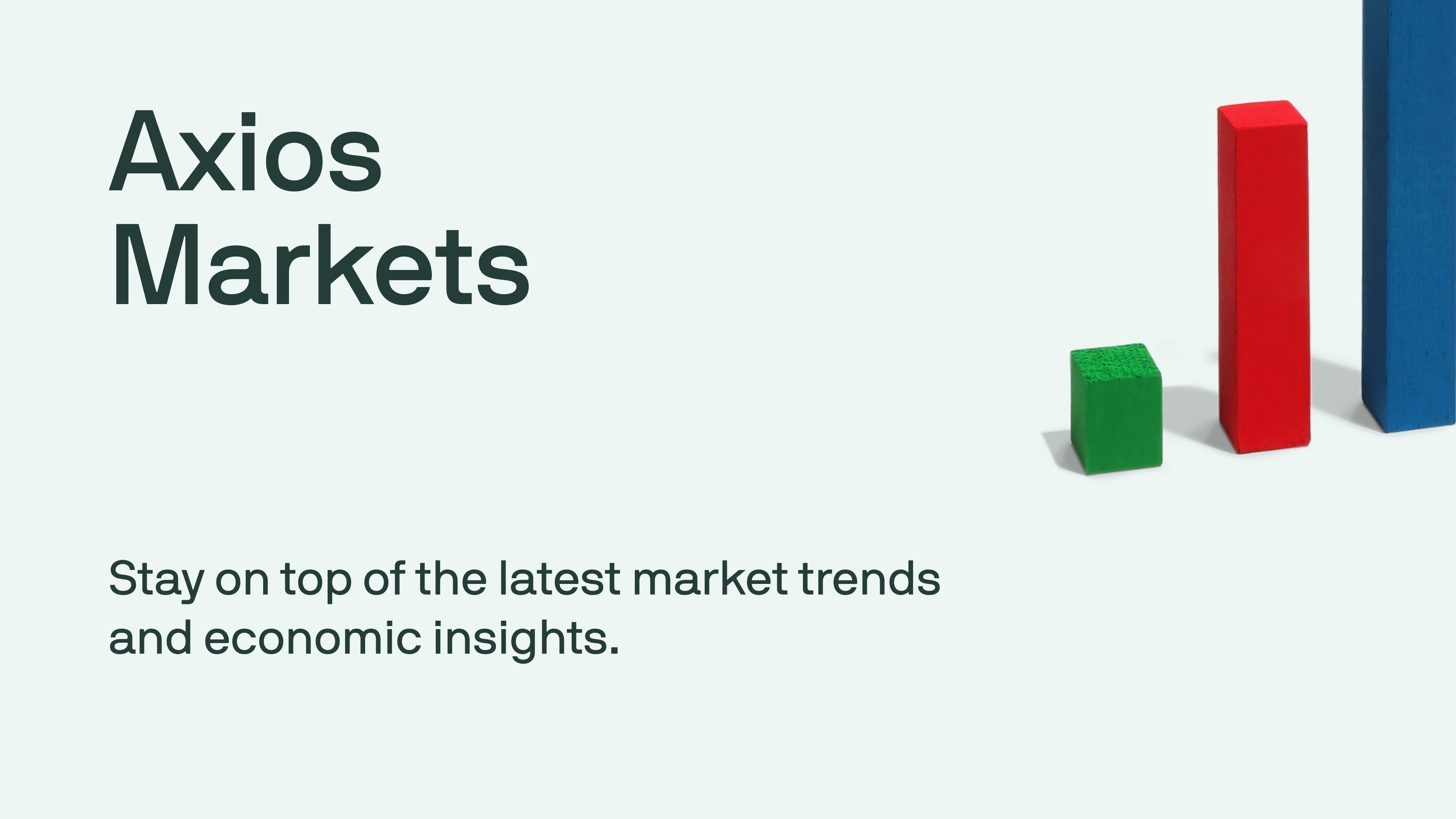 | | | | Get a daily look at the news and trends dominating the worlds of global business and finance. Why it matters: We highlight the stories that matter and share crucial economic insights. Stay informed in just a few short minutes. Subscribe for free | | | | | | Bonus: Where in the World? | 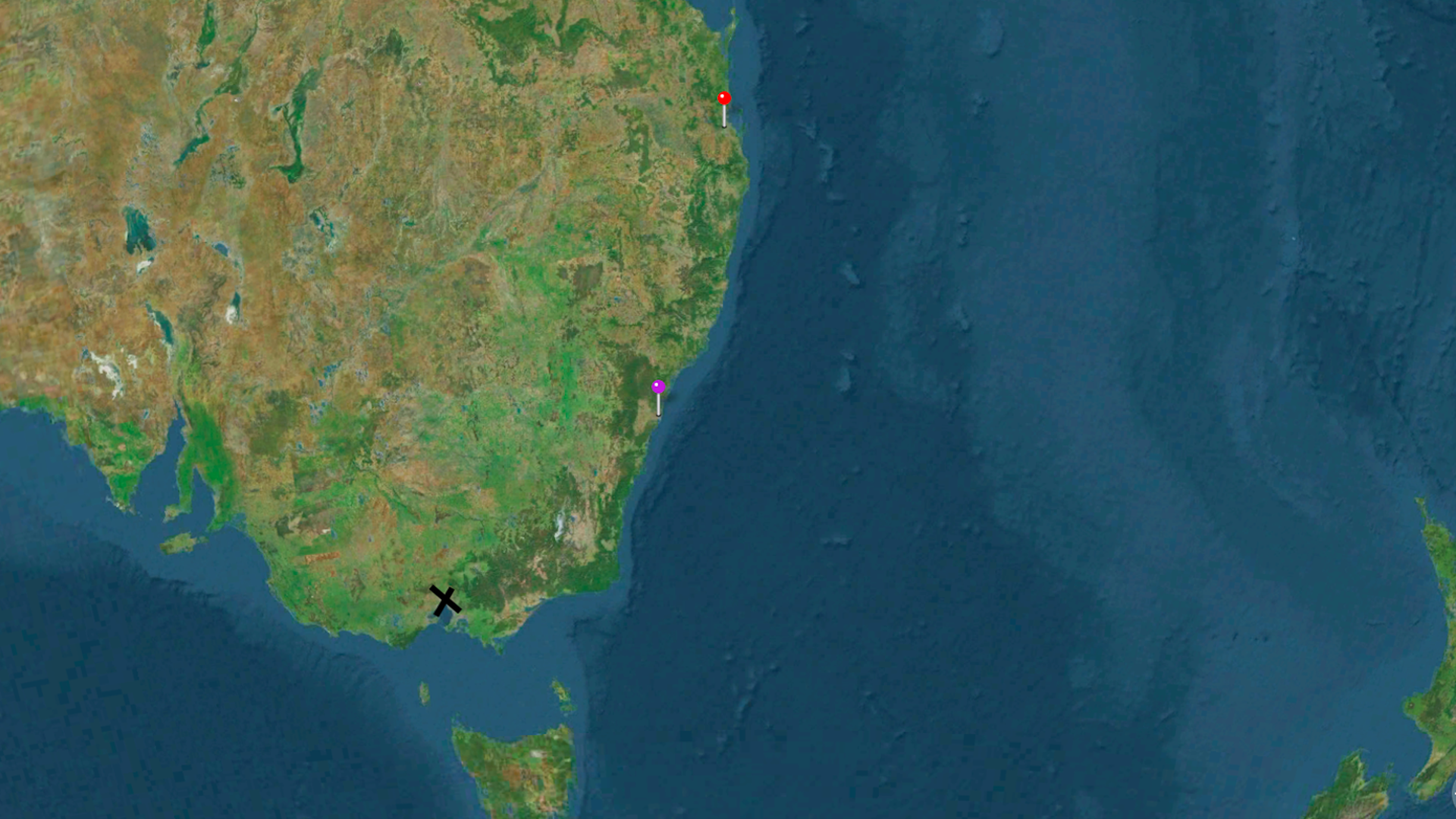 | | | Screengrab via Apple Maps | | | | Today, we're visiting two previous host cities of the Summer Olympics and one future one. They're marked with red and purple pins and a black X (I had to improvise). Can you name the cities and ID which is which? Scroll to the bottom for the answer. |     | | | | | | 4. Global news roundup |  Data: U.S. Customs and Border Protection; Chart: Connor Rothschild/Axios 1. The Biden administration is contending with a surge in migration across the southern border, and a growing percentage of the migrants are coming from farther south, Axios' Stef Kight reports. - Breaking it down: The number of Nicaraguans crossing the border has spiked amid domestic turmoil there, and more migrants are traveling from South America through the treacherous Darién Gap into Panama. Go deeper.
2. A top Chinese health official today said the government won't accept the World Health Organization's plans for a follow-up investigation into COVID-19's origins — labeling the lab leak theory, which the WHO intends to investigate, a "rumor," Axios' Rebecca Falconer writes. 3. The arrest on Tuesday of Tom Barrack, a business tycoon and close Trump ally, for allegedly acting as an unregistered Emirati agent could complicate relations between the Biden administration and the UAE, Axios' Barak Ravid writes. - The indictment indicates Barrack was in contact with the highest echelons of the Emirati leadership before and after Trump's election.
4. Tanzania's main opposition party says its leader and 10 other senior members were arrested on Wednesday, nominally for breaching COVID-19 protocols. - Why it matters: The opposition had hoped President Samia Suluhu Hassan would diverge from the authoritarian path of her late predecessor, John Magufuli, but now says such hopes have been dashed.
5. Turkish President Recep Tayyip Erdoğan and the Turkish-backed breakaway government in Northern Cyprus announced on Tuesday the partial reopening of the ghost town of Varosha, a once-stylish resort that was sealed off after its inhabitants fled during a Turkish invasion in 1974. - The U.S. condemned the "provocative" announcement and vowed to raise it at the UN Security Council. Turkey is the only country that recognizes Northern Cyprus.
|     | | | | | | 5. Congress, Europeans trash pipeline deal | 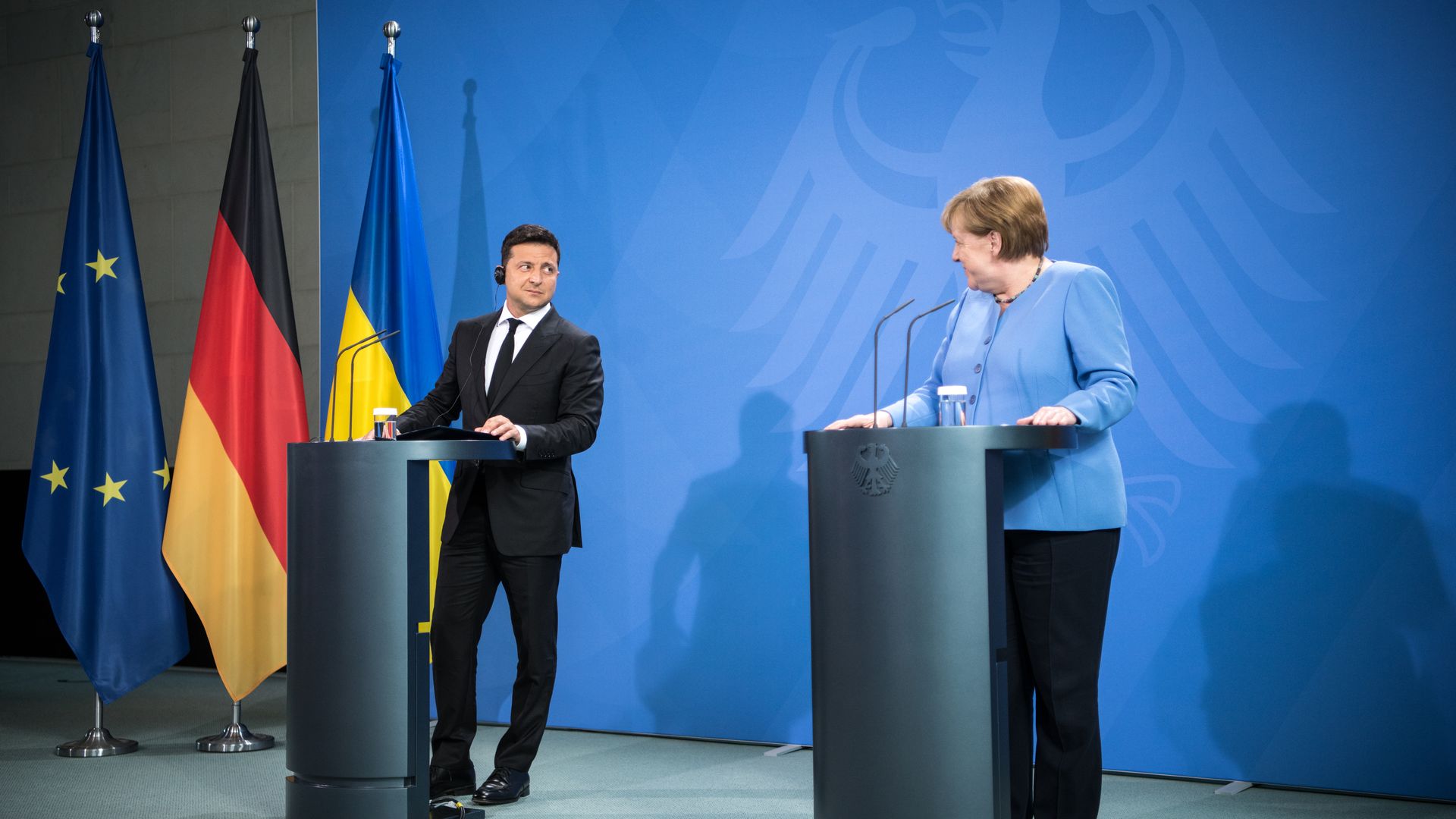 | | | Ukrainian President Volodymyr Zelensky and German Chancellor Angela Merkel. Photo: Stefanie Loos/Pool/Getty Images | | | | Almost nobody is happy with the U.S.-Germany deal on the Nord Stream 2 pipeline. On the Hill, Republicans like Sen. Ted Cruz expressed outrage and Democrats like Sen. Tim Kaine voiced concern. In Europe, the Ukrainians feel bullied and the Poles disappointed. The big picture: Ukraine and U.S. allies on the eastern flank of NATO argue the pipeline will make it easier for Moscow to isolate Kyiv and pressure Europe. They say the U.S.-Germany deal doesn't sufficiently address those concerns. - For Russia and Germany, though, the deal is confirmation a natural gas pipeline the Biden White House has called "a Kremlin geopolitical project that threatens European energy security" will be completed.
Driving the news: The Biden administration argues they secured the best deal they could from Germany on a pipeline that was 90% complete when they took office. - Germany pledged to "take action at the national level and press for effective measures at the European level, including sanctions," if Russia tries to "use energy as a weapon" or cuts off gas to its neighbor.
Between the lines: The administration was careful to emphasize that Ukraine had been consulted throughout the process. - But an adviser to Ukrainian President Volodymyr Zelensky tells Axios the steps announced Wednesday fall well short of their expectations and utterly fail to address Ukraine's security concerns.
Go deeper |     | | | | | | 6. What I'll be watching: The Olympics |  | | | U.S. gymnasts Simone Biles (R) and Jordan Chiles at a warmup session today. Photo: Loic Venance/AFP via Getty | | | | The opening ceremonies in Tokyo are about 12 hours away. - In just the latest hiccup, the person set to direct it was fired today over a newly resurfaced 1998 joke in which he referenced the Holocaust.
- Friday's action will also include rowing, cycling and tennis.
More headlines: - Guinea announced that it wouldn't be sending its delegation due to COVID-19, and then swiftly reversed that decision. Only North Korea has stayed away due to the pandemic.
- A Covid outbreak in the Czech camp has ruled out several athletes.
- Surfing, skateboarding, sport climbing and karate will debut at this Olympics, while baseball and softball will return. Go deeper.
Further reading: The underdogs from Latin America vying for Olympic gold |     | | | | | | 7. Stories we're watching | 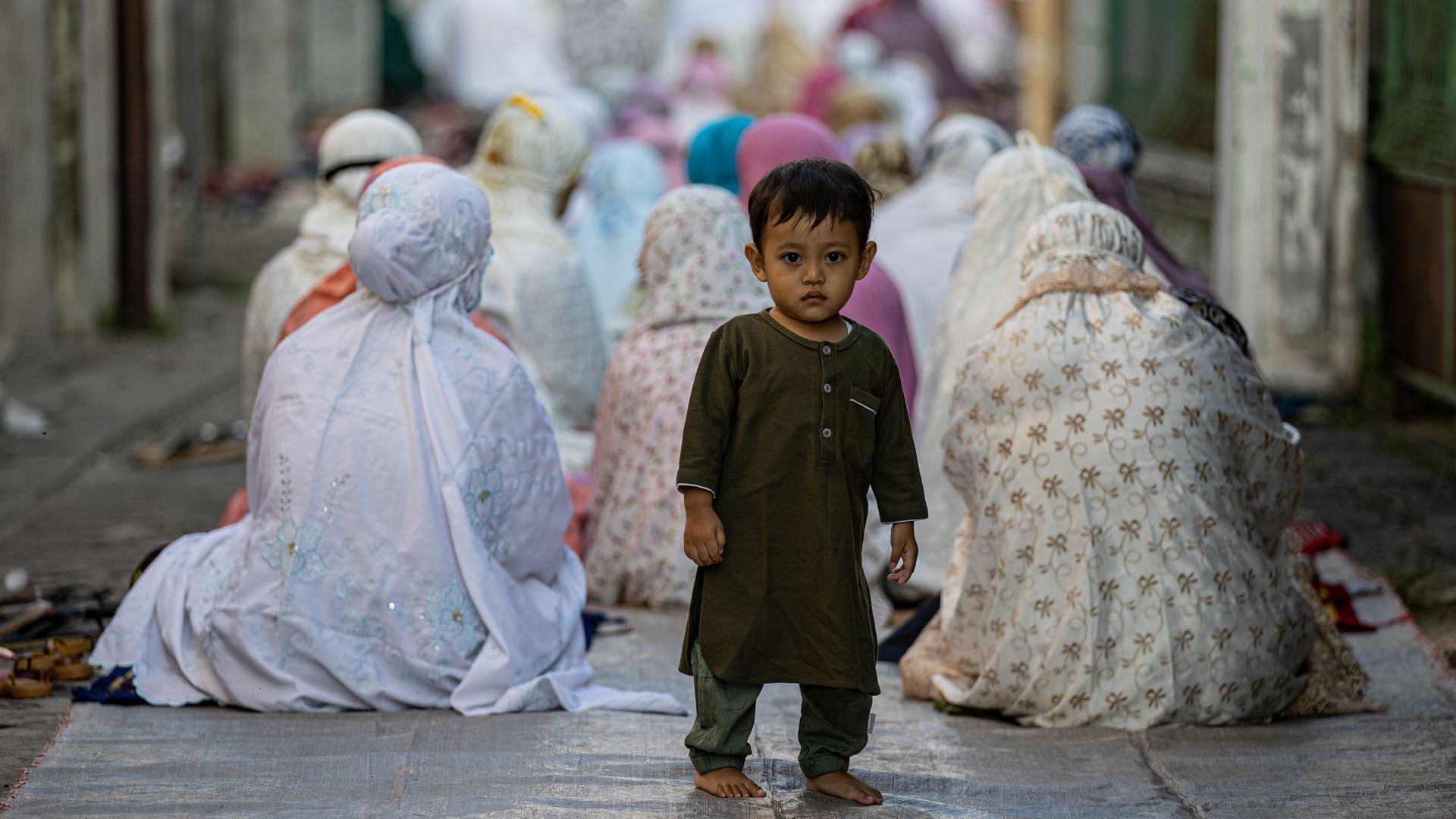 | | | Eid prayers, in Indonesia. Photo: Robertus Pudyanto/Getty Images | | | - COVID latest: WHO warns of new wave; France mandates vaccines for tourist sites; Pfizer vaccine to be produced in South Africa; India's true death toll
- China latest: Sherman to be top-ranking Biden visitor; Deadly floods in Henan; Hong Kong remains top financial center
- Biden picks Vicki Kennedy as ambassador to Austria
- 81 countries exploring central bank digital currencies
- YouTube pulls Bolsonaro videos over misinformation
- News orgs seek visas for Afghans who supported U.S. press
- Coal's global staying power
Quoted: "I'm certainly persuaded that what our officers and some family members, as well as other U.S. government employees, have experienced is real, and it's serious," — CIA Director Bill Burns to NPR on "Havana Syndrome." He said he's determined to get to the bottom of it. |     | | | | | | A message from Axios | | Market news worthy of your time | | |  | | | | Get a daily look at the news and trends dominating the worlds of global business and finance. Why it matters: We highlight the stories that matter and share crucial economic insights. Stay informed in just a few short minutes. Subscribe for free | | | | Answer: Brisbane (red pin, 2032); Sydney (purple pin, 2000); Melbourne (black X, 1956). |  | | It'll help you deliver employee communications more effectively. | | | | | | Axios thanks our partners for supporting our newsletters. If you're interested in advertising, learn more here.
Sponsorship has no influence on editorial content. Axios, 3100 Clarendon Blvd, Suite 1300, Arlington VA 22201 | | | You received this email because you signed up for newsletters from Axios.
Change your preferences or unsubscribe here. | | | Was this email forwarded to you?
Sign up now to get Axios in your inbox. | | | | Follow Axios on social media:    | | | | | |













No comments:
Post a Comment